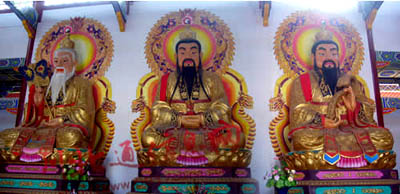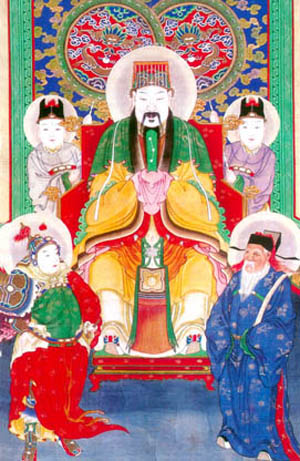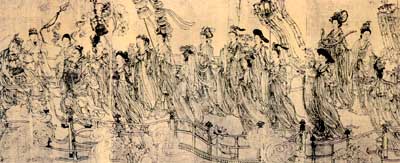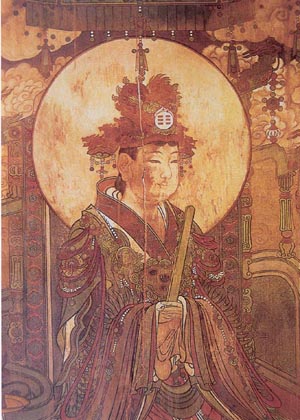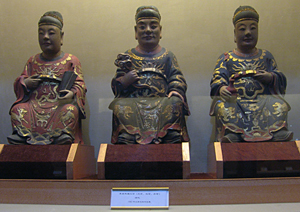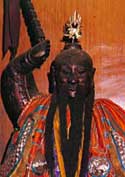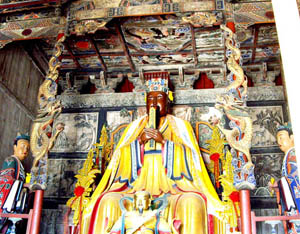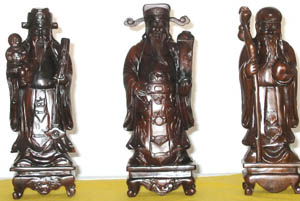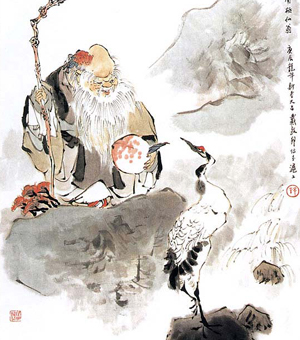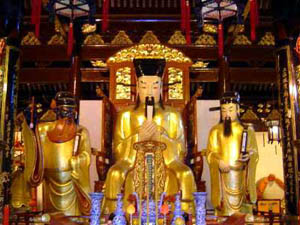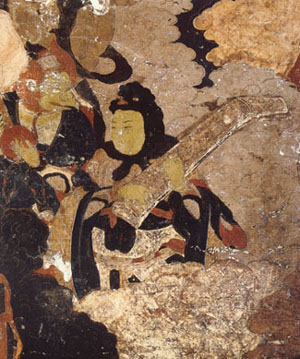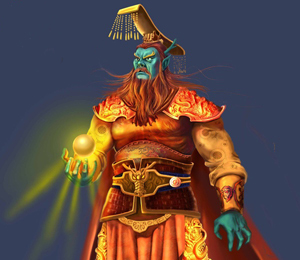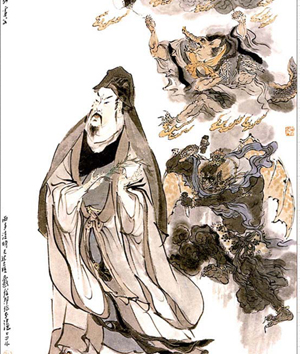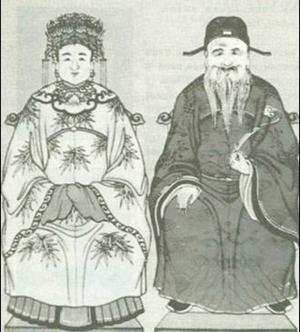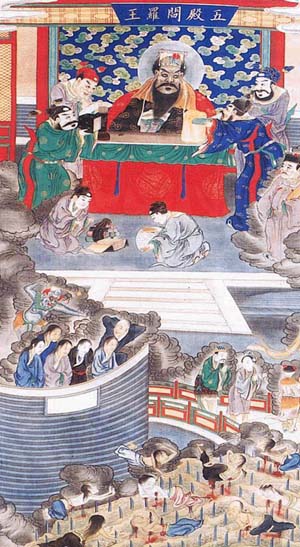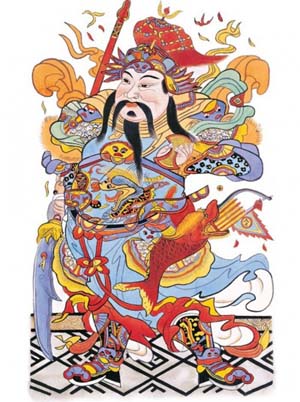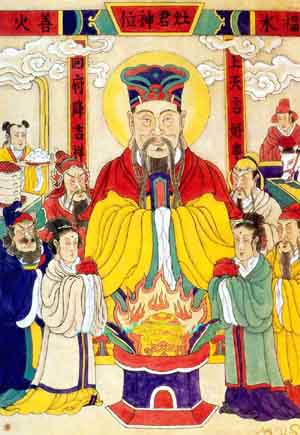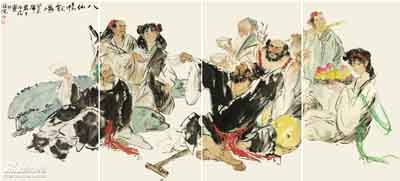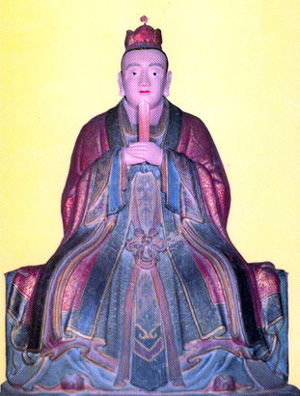The supreme belief of Taoism is "Tao" (the Way), which is indescribable and beyond human perception and understanding. "Tao" is believed to be the origin of the universe, the basis of the existence of all creatures, and the laws of development and change ruling all creatures. "Tao" sublimates into the qi (vital energy or breath), and gathers to form the Three Purities, i.e., the Celestial Worthy of Primordial Beginning or Jade Purity, the Celestial Worthy of Numinous Treasure or Highest Purity, and the Celestial Worthy of the Tao and its Virtue or Supreme Purity. Below the Three Purities, the emanations of Tao are a mass of deities such as the Jade Emperor, the Four Heavenly Emperors and the Five Emperors of the Five Directions, and the immortals who humans can become through self-cultivation. Deities and immortals, models in achieving Tao, make it their duty to teach and redeem all creatures, and are therefore worshiped by the Taoism followers.
 |
Laozi
According to Taoism, Laozi was the incarnation of Supreme Purity. It is said that he was once a historiographer of Zhou Dynasty (c. 1100-221 BC), who resigned his post to journey westward when he saw that the dynasty was in decline. At Hangu Pass, Yin X, the commander of the pass, aware that he was a sage, asked him to write a book to teach the "Tao". Laozi wrote a two-volume book, known to later generations as Daodejing (Canon of Tao and Its Virtue). The book is the foremost Taoist scripture, with Laozi being recognized as the originator of Taoism.
Three Purities
Three Purities were the supreme Taoist deities: the Celestial Worthy of Primordial Beginning, the Celestial Worthy of Numinous Treasure, and the Celestial Worthy of the Tao and its Virtue. The rule over the highest three celestial realms of Jade Purity, Highest Purity, and Great Purity. According to Taoism, they are emanations of Tao, omnipresent and supreme.
Jade Emperor
The Jade Emperor is believed to be the highest deity ruling the universe, lower only to the Three Purities, parallel to the emperor in the human world.
Taoist Divinities in Pilgrimage
Taoism is polytheism. Its deities include divinities in heaven, the gos of mountains, rivers, and land and immortals.
Queen Mother of the West
The Queen Mother of the West is believed to be the highest goddess in Taoism.
The Four Heavenly Emperors
The Four Heavenly Emperors are Gouchen, a celestial emperor representing the constellation surrounding the Polar Star; Ziwei, Emperor of North Polar Star; The Great Emperor of Longevity of the South Polar Star; and Houtu, the Earth Goddess. They assist Jade Emperor in the ruling of the universe.
The Three Divine Officials
The Three Divine Officials are the Official of Heaven, the Official of Earth, and the Official of Water. It is said that the Official of Heaven bestows blessings, the Official of Earth pardons sins, and the Offcial of Water eliminates disasters.
The Thunder Patriarch
The Thunder Patriarch is the avatar of the Perfect King of Jade Clarity and the ninth son of the Primeval Lord of Heaven. He is also said to be the Thunder Spirit, a deity in charge of thunder and rain, who is the immortalized Yellow Emperor with the title "Thunder Patriarch".
The Great Emperor Zhenwu, the Perfect Warrior.
The Three Star-gods of Happiness, Rank and Affluence, and Longevity.
The Old Man of Sothern Celestial Pole
The God of the Town
Stellar Sovereigns of the Five Planets and Seven Stars
The Stellar Sovereigns of the Five Planets and Seven Stars are seven Taoist deities. The Five Planets are the Year Star (Jupiter), the Sparkling Deluder (Mars), the Grand White Star (Venus), the Chronographic Star (Mercury), and the Quelling Star (Saturn). Together with the sun and moon, they are also called the Seven Stars. Taoism worships the Seven Stars as spirits and calls them Stellar Sovereigns. In early ancient times, people began to worship the sun, moon and stars.
The Father of Thunder and the Mother of Lightning
The Father of Thunder, the spirit in charge of thunder, is called Father for it is masculine, and can also be called the Master of Thunder or the Thunder Spirit. The Mother of Lightning, the spirit in charge of lightning, is called Mother for it is feminine, and can also be called the Sacred Mother of Golden Light or Lady Lightning. The worship of thunder and lightening originated in ancient times.
Dragon King
The Dragon is one of the four spirits of ancient Chinese mythology. The "Dragon Kings of the Five Emperors" each correspond to one direction; the "Dragon Kings of the Four Seas" each correspond to one sea; and the Fifty-Four Dragon Kings and Sixty-Two Divine Dragon Kings are distinguished according to all things in Heaven and on Earth.
Master of Rain
The Earth Spirit
In ancient China, there existed ceremonial rites of worshiping the earth and village. The village was the smallest local administrative unit.
Great Emperor of Fengdu
The Great Emperor of Fengdu1 is the divinity controlling hell and the dead.
The Yamas of the Ten Halls
The Yamas were also known as the Kings of Hell1 or Kings of Souls.
The Door Spirits are the spirits who guard the doors of houses.
The Kitchen Spirit
Eight Immortals: Zhongli Quan, Lv Dongbin, Zhang Guolao, Cao Guojiu, Li Tieguai, Han Xiangzi, Lan Caihe, and He Xiangu. They are models of achieving immortality through self-cultivation.
Celestial Master Zhang
Celestial Master Zhang, or Zhang Dongling, is one of the founders of Taoist religion.
Perfect Man Qiu Changchun
Perfect Man Qiu Changchun, also known as Qiu Chuji, is the founder of the Lonngmen Group of the Quanzhen Sect of Taoism.
(China.org.cn April 20, 2007)


